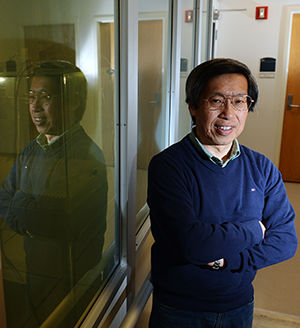New Liquid Crystals program to inspire innovation

Hiroshi Yokoyama, director of Kent State’s Liquid Institute, poses for a portrait outside of the third floor laboratory that will be the primary facility for incoming students of a new Liquid Crystal master’s program in fall of 2015. Yokoyama will direct the new program.
April 29, 2015
The Liquid Crystal Institute plans to debut its new Master of Science in Liquid Crystal Engineering program starting Fall 2015.
The program is to inspire the inventors of society to take a more hands-on approach to their studies and will focus on teaching students about the application of liquid crystal engineering in addition to the fundamentals of liquid crystal technology. Examples of liquid crystal technology include smartphone screens and modern televisions.
“In order to address the immediate need of engineers, we need to start mid-level higher education training,” said Hiroshi Yokoyama, director of the Liquid Crystal Institute. “(This can be achieved) with the opportunities offered in practical learning — not only (from) basic understanding of liquid crystals, physics and chemistry, but with an equal emphasis on lab skills, such as assembly of liquid crystal devices.”
Yokoyama has a plan for the program, which includes a summer project worth credits toward the program.
“Students are to (create) something tangible (a prototype), perhaps an electro-optic device,” Yokoyama said. “It’s a mixture of students’ own ideas, and we offer resources where students can achieve something meaningful.”
He has been working on this project with a team of faculty members, including chemical physics professors Antal Jakli, Peter Palffy-Muhoray and Philip Bos.
“The goal for this degree program is these students should be prepared to take jobs in this industry,” said chemical physics professor Robin Selinger. “(With) companies, including local companies like AlphaMicron and Kent Displays, and worldwide companies like LG and Merck… our hope is that these companies are going to be interested in hosting our students for internships and potentially for career placements later.”
Jakli said he hopes that companies like Apple will be more likely to consider Kent State students for sponsorship in their companies. Selinger said that a substantial portion of Kent State alumni have already moved on to work for Apple.
“It’s part of our culture at Kent State; it’s sweeping the nation,” Selinger said. “The idea that kids just don’t want to text each other all the time, they want to invent things. They want to take stuff apart and put it together another way. They want to innovate.”
Selinger also said that this master’s program will be a “terminal master’s,” meaning that students can go out and find a career in liquid crystal engineering without having to get their doctorate degree.
The classes in this program will be tailored to what certain industries expect from students leaving college, said Jakli, who also is a graduate coordinator for the Liquid Crystal Institute and for the master’s program.
“We will have some classes, which are connected to some companies here,” Jakli said. “We will get guest speakers, which will be coming from Apple and Samsung. They will be talking about real industrial problems.”
This program is available to anyone taking a major in chemistry, physics or chemical engineering.
For more information on the available classes, companies involved and even estimates on tuition to take the program, you can find more on the Liquid Crystal Institute’s website by clicking here.
Contact Jacob Runnels at [email protected].
























